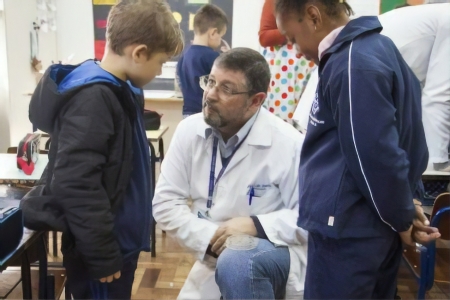25 Julho de 2019
More than 800 Univates students volunteer in extension projects
"Participating in extension projects makes me realize that Univates is not just a place to learn the content of the courses, it's also where I can become a professional with a more humanistic background." The statement is from the Electrical Engineering student Marcelli Schossler Flores. She is a scholarship holder in the extension project Vem pra Cá and a volunteer in Marias: Body and Language in the Prison Institution, both of the program Art, Esthetics and Language of Univates.
Marcelli is one of more than 800 Univates students who volunteer in an extension project of the institution - that number is about ten times higher than in 2015. Participant of Vem pra cá for almost two years and Marias for a year, the academic sees education as an opportunity for transformation. "In Vem pra cá, we teach Portuguese to the immigrants living in Lajeado, so that they feel welcomed by us. It is gratifying to see their results and their evolution during the year," she says.
According to Marcelli, with the participation in the extension projects, she learned to look at people without making judgments and to live with a public with which she was not accustomed until then. "The projects make me leave my comfort zone. I challenge myself more every day." Among the advantages of engaging with extension, she points out that her performance may reflect on the job market later on. "In the lessons of the projects we work together, we discuss issues and present different points of view. This interaction helps in the exchange of ideas, essential in the labor market," she explains.
In Marias, the academic works with activities in the female prison of Lajeado. "We elaborate actions with the purpose of showing the women who are there that, regardless of the difficulties presented, all are able to carry out the activities. In addition, we have listened to them because Univates has been there for almost two years, so they feel comfortable expressing their feelings most of the time," she says.
In Vem pra cá, the scholarship holder recalls a special moment with the immigrants that happened in 2018. "In class, I explained to them about the holiday of September 20th. One student came up with the idea of getting together that day and having a barbecue. The date arrived, we had a lesson about the gaucho culture and we made bread and sausage, something simple, but that marked them. To this day they remember that moment," she says. For Marcelli, "to volunteer is to donate our time and receive experiences from situations that we might never face."
Indissociability among extension, teaching and research
According to Merlin Janina Diemer, the educational coordinator of academic extension and Professor of Architecture and Urbanism at Univates, "extension projects are part of the essence of communitarian higher education institutions, such as Univates." Currently, there are 34 projects in the institution, organized in 6 programs.
An extension project occurs when there is direct action with the community outside the University. "Today we work with senior citizens, indigenous people, immigrants, schools, prisons, Family Health Strategy (ESF), among others. Univates is a communitarian institution, so extension is at its core. Since 2015, we have encouraged student involvement in these activities, which has resulted in a significant increase in student numbers," Merlin acknowledges. Among the objectives of the extension activity are the impact of the project and the transformation in the community. Therefore, actions must be continuous.
In the actions of the projects occurs the inseparability between extension, teaching and research.
“Extension is the principle of the relationship with the community, through which the interaction of academic and popular knowledge occurs. The protagonism of the student is fundamental, because, when acting in the community, they carry out investigative and survey processes for later intervention. The result of the experience is the learning acquired by the academic”, Coordinator of academic extension, Merlin Janina Diemer.
In actions there is always a teacher who accompanies and mediates between student and community. Still according to the professor, another characteristic of extension is interdisciplinarity, that is, the coverage of several areas of knowledge in each project to strengthen actions in the community.
